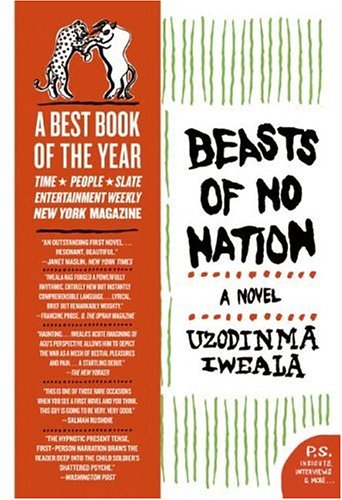“The whole world is spreading before me and I am looking up to the grey sky moving slowly slowly against the top leaf of the tall tall Iroko tree. And under this, many smaller tree is fighting each other to climb up to the sunlight.… This is making me think of jubilating, dancing, shouting, singing because Kai! I am saying I am finally dead.”
 Agu is a young boy recruited by a guerilla unit during a civil war in an anonymous West African country. Taken away from his Bible-reading, spiritual mother, now amidst brutal men, Agu is torn between the beastly violence he witnesses and the paternal figure of his commander, in a brutal world where crime is ordinary and humaneness remains rare and precious.
Agu is a young boy recruited by a guerilla unit during a civil war in an anonymous West African country. Taken away from his Bible-reading, spiritual mother, now amidst brutal men, Agu is torn between the beastly violence he witnesses and the paternal figure of his commander, in a brutal world where crime is ordinary and humaneness remains rare and precious.
Although situated in a long line of child soldier stories, Iweala’s brilliant novel is really a story about how language creates things, images, and worlds.
Language is one of the major achievements of this novel. It is through language and dialogue that Agu fights his demons and rediscovers the innocent, “normal” boy he once was. And through Agu’s eyes the reader comes to know the savagery, but also the spectacular beauty of his world. A world haunted by fear, the horrors of war and the absence of humanity, and mirrored by his inside words.
Instead of chronicling a coming-of-age or a loss of innocence, Beasts of No Nation is more about exploring what innocence actually is. And in Iweala’s novel, it is synonymous with being able to speak for oneself, to voice out the demons inside oneself. Innocence is letting go and freeing oneself and, for Agu, freedom is speech.
Beasts of No Nation by Uzodinma Iweala
Harper Perennial | 2006 | ISBN: 978-0060798680
Review by Ioana Danaila